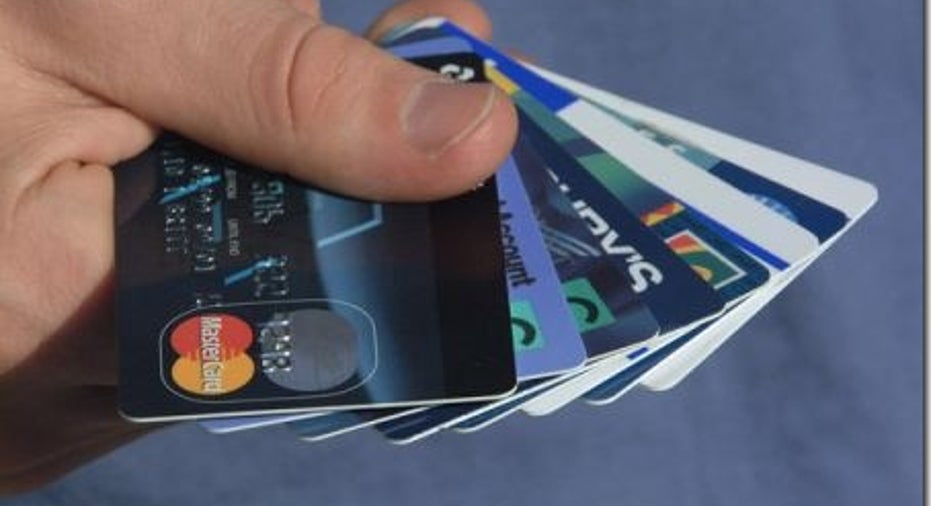Consumer Credit Card Balances See 1st Drop in 5 Months

Consumer credit card balances tumbled in January, ending a four-month streak in which card balances steadily rose. But the modest drop in credit card debt was overwhelmed by a surge in student loan debt.
The Federal Reserve's G.19 consumer credit report released Wednesday showed a 4.4% drop in revolving debt, after rising steadily for the last four months. Revolving debt, which is made up almost entirely of credit card debt, declined by $3 billion in January to $800.9 billion.
Experts say that consumers often spend less in the first month of the year, after racking up a significant amount of debt during the holidays. "Typically, for instance, for the holiday season, people tend to spend a lot in November and December and then spend quite a bit less in January," says Robert Mellman, a senior economist at J.P. Morgan Chase. To account for that trend, the Federal Reserve tweaks -- or "seasonally adjusts" -- its numbers prior to releasing them. However, cardholders may have been especially aggressive this year with paying down their holiday debt.
The Fed's monthly G.19 consumer credit report also looks at nonrevolving debt, which includes auto loans, student loans and loans for mobile homes, boats and trailers. Nonrevolving debt went up 14.7% to $1.7 trillion -- the steepest rise, percentage-wise, in 10 years. Overall consumer credit -- the combination of both revolving and nonrevolving debt -- also increased by $18 billion. Total consumer credit jumped by 8.6% in January, hitting $2.5 trillion.
Experts say that the rise in nonrevolving debt is largely due to an explosion in student loan debt. In fact, if you subtract federal government loans -- which are mostly made up of student loans -- from the total number of nonrevolving loans, you would see that government loans have only gone up about $5 billion on a nonseasonally adjusted basis, says David Nice, an associate economist with Mesirow Financial. "So basically that's saying the brunt of the nonrevolving debt is the federal government series which is made up mostly of student loans."
Federal loans also tend to spike in January because that's when the spring semester's loans are disbursed, says Mark Kantrowitz, publisher of FinAid.org and Fastweb.com. In addition, he says, students are struggling to keep up with rising costs and are taking out larger numbers of loans. "The failure of grants to keep pace with the increase in college costs is a key driver of borrowing," says Kantrowitz. "That money doesn't magically appear from thin air. It comes from the families." And if they don't have it, then students have to borrow to pay for school.
Nice adds that high unemployment is also a significant factor driving up student loans. "In the past few years, the job market has been subpar, to say the least," he says, and that has driven students to stay in school longer and people who were out of a job to go back and try to polish up their resumes with new skills.
Holiday debt may dampen credit spending
According to the National Retail Federation, retail spending is usually sluggish in January. However, this year, consumers spent more than expected. "Thanks to a combination of unseasonably warm weather across much of the country and millions of shoppers with gift cards burning holes in their pockets, retailers are riding the tailwinds of consumers' spending power," said National Retail Federation President and CEO Matthew Shay in a press release.
However, experts say the overall sales figures from the past several months have still been disappointing, despite the slightly higher retail sales. "The numbers on consumer spending have been on the weak side lately," says Mellman. "The past few months, they've been a little weaker than we had expected."
That may be contributing to the smaller credit card balances. However, Mellman predicts that spending will bounce back soon. "We're thinking that the slowdown is temporary and that within a month or two, consumer spending will be up," says Mellman.
It's possible that cardholders may simply be paying down their holiday debt balances and will start charging more once they've paid off their Christmas presents. Or they could be buying less overall because the stress over their bigger card balances is overwhelming their desire to spend.
For the first half of 2011, consumers steadily paid down their card balances. But in the past seven months of the year, balances fitfully rose before retreating again in January. Experts predicted that balances would continue to rise in 2012. However, January's decline in credit card balances may mean consumers are serious about keeping their debt levels low, especially with an uncertain economy.
"Our view is the economy, it's been a pretty tough slog, it's going to get gradually better, but not really dramatically," says Mellman.
And that may be dampening consumers' enthusiasm to pull out their cards. The economy strengthened considerably in the last quarter of 2011 after a mostly sluggish year, but it's still nowhere near pre-recession levels.
The unemployment rate dropped to 8.3% in January, according to the Bureau of Labor Statistics' most recent employment report, beating economists' expectations. The Commerce Department also reported that more consumers got a raise in the first month of the year, with personal income rising slightly. But a slightly fatter wallet may not have been enough for many consumers' to pay off their holiday debt completely and feel better about spending.
Experts are optimistic, however, that consumers will spend more as the economy improves. "Before, they had real reason to fear losing their job and so they wouldn't want to burden themselves with more credit card debt," says Mesirow's David Nice. But as the employment situation improves, consumers will become more willing to spend -- especially on big-ticket items they put off buying after the recession.
"The trend is up," adds Mellman, even though credit card borrowing dropped in January. "The economy is getting a little better and borrowing and lending is starting to increase."



















